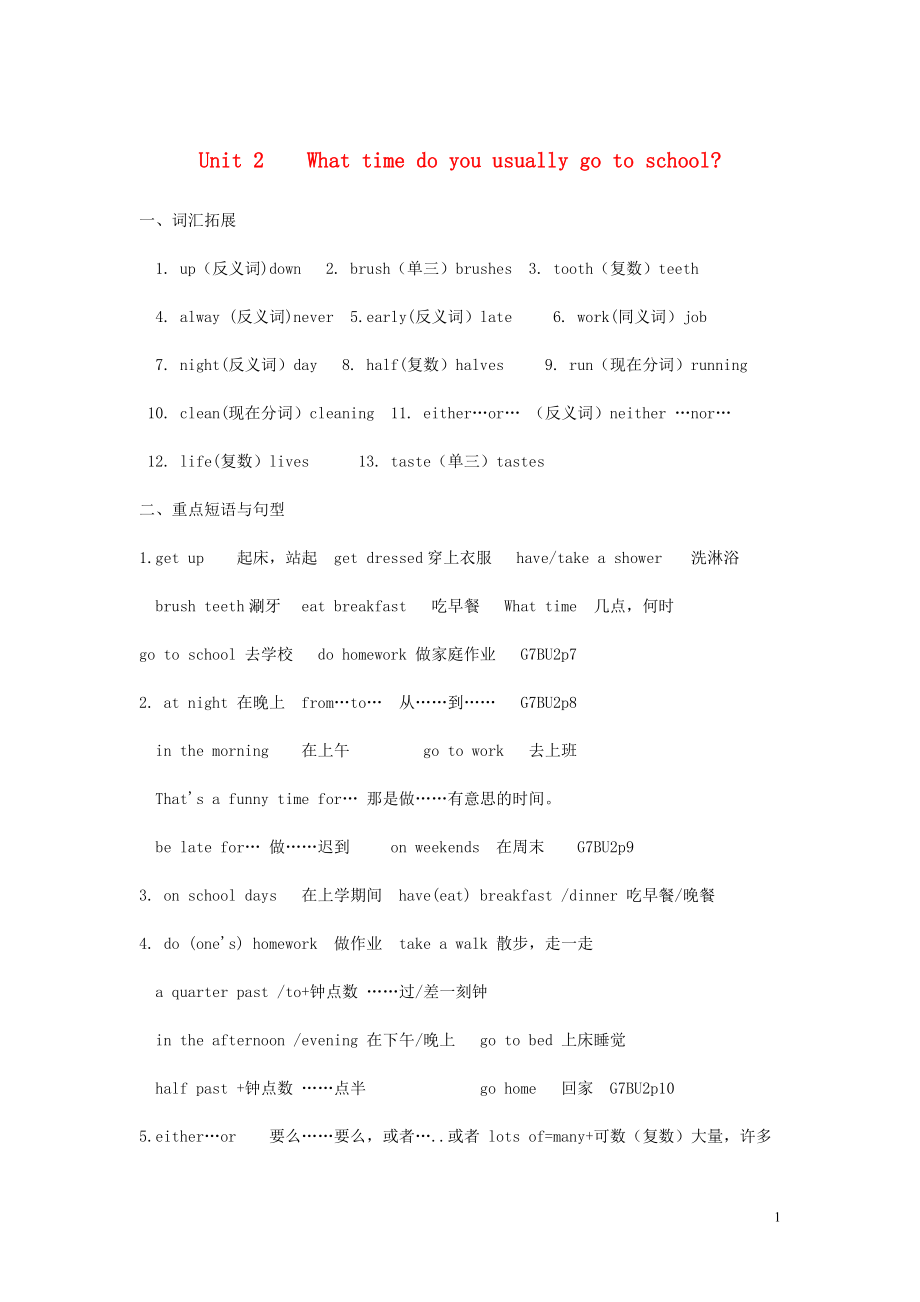《2019年七年級(jí)英語(yǔ)下冊(cè) Unit 2 What time do you go to school知識(shí)點(diǎn)總結(jié) (新版)人教新目標(biāo)版》由會(huì)員分享,可在線(xiàn)閱讀����,更多相關(guān)《2019年七年級(jí)英語(yǔ)下冊(cè) Unit 2 What time do you go to school知識(shí)點(diǎn)總結(jié) (新版)人教新目標(biāo)版(3頁(yè)珍藏版)》請(qǐng)?jiān)谘b配圖網(wǎng)上搜索。
1����、Unit 2 What time do you usually go to school?
一、詞匯拓展
1. up(反義詞)down 2. brush(單三)brushes 3. tooth(復(fù)數(shù))teeth
4. alway (反義詞)never 5.early(反義詞)late 6. work(同義詞)job
7. night(反義詞)day 8. half(復(fù)數(shù))halves 9. run(現(xiàn)在分詞)running
10. clean(現(xiàn)在分詞)cleaning 11. either…or… (反義詞)neither …nor…
2����、
12. life(復(fù)數(shù))lives 13. taste(單三)tastes
二、重點(diǎn)短語(yǔ)與句型
1.get up 起床��,站起 get dressed穿上衣服 have/take a shower 洗淋浴
brush teeth涮牙 eat breakfast 吃早餐 What time 幾點(diǎn)��,何時(shí)
go to school 去學(xué)校 do homework 做家庭作業(yè) G7BU2p7
2. at night 在晚上 from…to… 從……到…… G7BU2p8
in the morning 在上午 go to work
3、去上班
That's a funny time for… 那是做……有意思的時(shí)間����。
be late for… 做……遲到 on weekends 在周末 G7BU2p9
3. on school days 在上學(xué)期間 have(eat) breakfast /dinner 吃早餐/晚餐
4. do (one's) homework 做作業(yè) take a walk 散步,走一走
a quarter past /to+鐘點(diǎn)數(shù) ……過(guò)/差一刻鐘
in the afternoon /evening 在下午/晚上 go to bed 上床睡覺(jué)
h
4���、alf past +鐘點(diǎn)數(shù) ……點(diǎn)半 go home 回家 G7BU2p10
5.either…or 要么……要么�,或者…..或者 lots of=many+可數(shù)(復(fù)數(shù))大量���,許多
eat quickly 吃得快 play sports 做運(yùn)動(dòng)
have much time for …有許多時(shí)間做…… for half an hour 半小時(shí)
get home 到家 eat a good breakfast早餐吃得好��,好好吃一頓早餐
eat…for lunch 午餐吃…… after lunch /dinn
5��、er 午餐/晚餐后
be (not) good for 對(duì)……健康有(沒(méi))益 taste good 嘗起來(lái)好吃 G7BU2p11
6. have a shower 洗澡 have a very healthy life 有健康的生活
need to do … 需要做…… after doing to have … 為了有…… 做……后
from Monday to Friday從周一到周五 radio station廣播電臺(tái)
make breakfast for sb.替某人做早飯 get to school 到校 G7BU2p12
6����、
三����、典句必背
1. What time do you usually get up? I usually get up at six thirty.
2. That’s a funny time for breakfast.
3. When do students usually eat dinner?
They usually eat dinner at a quarter to seven in the evening.
4. In the evening, I either watch TV or play computer games.
5. At twelv
7�����、e, she eats lots of fruit and vegetables for lunch..
6. She knows it’s not good for her, but it tastes good.
7. Here are your clothes.
四、語(yǔ)法薈萃
1���、what time和when引導(dǎo)的特殊疑問(wèn)句����。
(1)對(duì)時(shí)間提問(wèn)用what time����,也可以用when。詢(xún)問(wèn)鐘點(diǎn)時(shí)用what time���,詢(xún)問(wèn)日期��、月份�、年份時(shí)用when�。
(2)詢(xún)問(wèn)做某事的時(shí)間時(shí),兩者可以互換��。 (3)其他詢(xún)問(wèn)時(shí)間的句子:
What's the time? =W
8���、hat time is it?現(xiàn)在幾點(diǎn)了���?
時(shí)刻表達(dá)法:順讀法和逆讀法����。
(1)順讀法:“鐘點(diǎn)+分鐘”直接讀數(shù)字�����。
(2)逆讀法:借助介詞past或to表示����,要先說(shuō)分再說(shuō)鐘點(diǎn)。
A.當(dāng)分鐘不超過(guò)30分鐘時(shí)(包括30分鐘)����,即<或=30,用past表示���。其結(jié)構(gòu)為:“分鐘+past+整點(diǎn)” 意為“幾點(diǎn)過(guò)幾分”�。
B.當(dāng)超過(guò)30分鐘時(shí)��,即>30����,用to表示����。其結(jié)構(gòu)為:“所差分鐘(即60—所
過(guò)分鐘數(shù))+to+下一個(gè)整點(diǎn)”�,to譯成“差”�,差幾分鐘到幾點(diǎn)。
C.當(dāng)分鐘為30分鐘用half表示����,當(dāng)分鐘為15分鐘用a quarter。
五����、佳作欣賞
My Scho
9、ol Day
I am a student. I usually get up at seven, and I eat breakfast at seven thirty. Then I go to school at eight. School starts at eight thirty. I eat lunch at taelve. I go home at 17:00. I often eat dinner at 19:00 and then play the piano. I do my homework at 20:00. At 22:00, I go to bed.
3
 2019年七年級(jí)英語(yǔ)下冊(cè) Unit 2 What time do you go to school知識(shí)點(diǎn)總結(jié) (新版)人教新目標(biāo)版
2019年七年級(jí)英語(yǔ)下冊(cè) Unit 2 What time do you go to school知識(shí)點(diǎn)總結(jié) (新版)人教新目標(biāo)版

